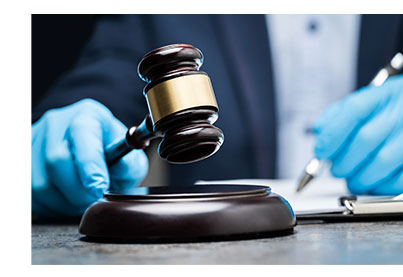 |
THIS ISSUE'S HEADLINES
Courts Start to Weigh In on COVID-19 Lawsuits
Keys to Creating a Successful Succession Plan for Closely Held Businesses
Employee’s “Odd” Behavior Justified Mandatory Drug Test
Data Privacy Rights for the Greater Good Webinar, July 8
Stay Informed with PLDO COVID-19 Resources

COURTS START TO WEIGH IN ON COVID-19 LAWSUITS
 PLDO recently issued an advisory about the forthcoming explosion of lawsuits arising out of the coronavirus pandemic. Specifically, the article addressed the legal concept of “force majeure” and predicted that many businesses will claim that the pandemic prevented them from performing their contractual obligations, which is the thrust of force majeure - a party’s ability to be excused from performing their obligations in a contract based upon so-called “acts of God” or unforeseen circumstances. PLDO recently issued an advisory about the forthcoming explosion of lawsuits arising out of the coronavirus pandemic. Specifically, the article addressed the legal concept of “force majeure” and predicted that many businesses will claim that the pandemic prevented them from performing their contractual obligations, which is the thrust of force majeure - a party’s ability to be excused from performing their obligations in a contract based upon so-called “acts of God” or unforeseen circumstances.
The advisory author, PLDO Partner Brian J. Lamoureux’s prediction was on the mark as lawsuits have started winding their way through the courts. Many of these cases involve insurance disputes over coverage and losses, lawsuits between suppliers and buyers of raw material and products, and employment disputes among unions, employees, and employers over working conditions. Another particularly hot area for COVID-19 disputes is playing out in bankruptcy courts throughout the country. Indeed, we have seen the beginning of the end of many former blue-chip companies such as Hertz, Neiman Marcus, and JC Penney, to name a few. Although it is much too early to draw any firm conclusions about how all of this litigation will play out, a very recent bankruptcy decision out of Illinois provides an interesting insight into how courts might handle these difficult situations.
In his follow-up advisory, Attorney Lamoureux describes the Illinois case and offers three key takeaways for readers to consider, including the approach courts may take to resolve disputes caused by the pandemic crisis. To access the advisory, click on Courts Start to Weigh In on COVID-19 Lawsuits. For more information, please contact Attorney Lamoureux at 401-824-5100 or email bjl@pldolaw.com.
[back to top]

CREATING A SUCCESSFUL SUCCESSION PLAN FOR CLOSELY HELD BUSINESSES
 Entrepreneurs possess unique characteristics and talents that they apply to create a new business, including being comfortable taking risks in order to bring into existence new products or services. When the founder of a business decides to slow down or retire, he or she assumes a different type of risk than what they encountered in originating their business – the risk of failure when transitioning to the next generation. Entrepreneurs possess unique characteristics and talents that they apply to create a new business, including being comfortable taking risks in order to bring into existence new products or services. When the founder of a business decides to slow down or retire, he or she assumes a different type of risk than what they encountered in originating their business – the risk of failure when transitioning to the next generation.
Although entrepreneurs are comfortable when the risk-taking is within their control, transitioning their business to a family member vs. unrelated third-party buyer is a totally different ballgame. In those circumstances, the most significant concern is not necessarily about a return on investment, rather, it is in preserving his or her legacy of the business they created.
Of course, the issue of retirement income is part of the equation in that most of the founder’s assets are tied up in the business, which means a successful transition is essential to future lifestyle. It is sometimes less stressful and more prudent to sell to an unrelated third party; however, this decision is not easy when a family member has been in the business for an extended period of time and wants the opportunity to become the owner.
Business continuation and succession planning is one of the most challenging obstacles the owners of family and closely held businesses face. Despite recognizing its importance, most business founders do not give succession planning the attention it deserves simply because they do not know where to start.
To assist in starting the decision-making process, PLDO Managing Principal Gary R. Pannone provides his insight in his advisory, Keys to Creating a Successful Succession Plan for Closely Held Businesses. Drawing upon decades of experience advising business owners across industries to successfully develop and execute succession plans, Attorney Pannone provides a 14-point outline of questions the parties should answer and the various challenges to consider as part of building the framework for transitioning ownership of a business. If you would like to speak with Attorney Pannone about succession planning or other business matters, please call 401-824-5100 or email gpannone@pldolaw.com.
[back to top]

EMPLOYEE’S “ODD” BEHAVIOR JUSTIFIED MANDATORY DRUG TEST
 Most employers know that they cannot insist that an employee take a drug test unless the employer has “reasonable grounds” to believe that an employee’s job performance is impaired by drug use. Also, the employer must observe contemporaneous evidence of impairment such as behavior or speech. It is not simply enough to have a hunch or a suspicion of drug use. Most employers know that they cannot insist that an employee take a drug test unless the employer has “reasonable grounds” to believe that an employee’s job performance is impaired by drug use. Also, the employer must observe contemporaneous evidence of impairment such as behavior or speech. It is not simply enough to have a hunch or a suspicion of drug use.
Last month, the Rhode Island Supreme Court upheld an employer’s firing of an employee who refused to submit to a drug test. In that case, the employee was a delivery driver who allegedly injured himself making a delivery. Unbeknownst to his employer, the driver also had a medical marijuana card due to pre-existing injuries. When the driver reported his injury to his manager, the driver was described as acting “weird” by his coworkers. Smartly, the manager enlisted the help of a fellow manager to observe and corroborate his version of events.
After the driver was fired, he sued his employer, claiming that his behavior was caused by the injury he suffered while making the delivery. Therefore, he claimed that his employer did not have reasonable grounds to believe he was under the influence. The Supreme Court disagreed and held that, based upon the corroborated reports regarding the employee’s behavior, the employer had reasonable grounds to insist upon a drug test.
There are two key takeaways from this important case. First, it underscores how critical it is for managers to contemporaneously and competently chronicle their interactions with an impaired employee. Whenever possible and appropriate, managers should enlist the assistance of another “set of eyes” on the situation as a means of protecting everyone involved from rash conclusions or improper assumptions. Two sets of eyes are always better than one.
Second, the Supreme Court does not appear eager to second-guess employers’ decisions if employers can point to specific and articulated reasons justifying their insistence that an employee be drug tested. As long as those reasons are reasonable, courts will generally defer to the employer’s conclusions. And, although the Supreme Court did not focus on this employee’s holding of a medical marijuana card as an issue in this case, employers should continue to always tread carefully when confronting or disciplining employees who are suspected of impairment by legal or illegal drugs.
If you have questions or would like more information on this issue or other employment and business matters, please contact PLDO Partner Brian J. Lamoureux at 401-824-5100 or email bjl@pldolaw.com.
[back to top]

DATA PRIVACY RIGHTS FOR THE GREATER GOOD WEBINAR, JULY 8
 “Data Privacy Rights for the Greater Good” is the topic of discussion during a webinar with PLDO Partner Brian J. Lamoureux and Derek Boczenowski, VP of IT Audit at Compass IT Compliance, on Wednesday, July 8, 2020 at 1 p.m. The webinar will address the use of tracking methods and measures deployed in the workplace as a result of the COVID-19 crisis and the potential for “mission creep” over time that may further erode our privacy rights under the guise of the “greater good.” “Data Privacy Rights for the Greater Good” is the topic of discussion during a webinar with PLDO Partner Brian J. Lamoureux and Derek Boczenowski, VP of IT Audit at Compass IT Compliance, on Wednesday, July 8, 2020 at 1 p.m. The webinar will address the use of tracking methods and measures deployed in the workplace as a result of the COVID-19 crisis and the potential for “mission creep” over time that may further erode our privacy rights under the guise of the “greater good.”
Panelists will discuss the huge volume of data collection in the “new normal” and its associated risks, as well as the implications of navigating unchartered waters while complying with the myriad of evolving employment laws and regulations. They will also explore the impact of new products and emerging uses of tracking applications that go beyond the government’s original intent and purpose of safeguarding the public’s health and well-being during the pandemic. For more information and to register for the webinar, visit Webinar Registration – DATA PRIVACY RIGHTS FOR THE GREATER GOOD.
[back to top]

STAY INFORMED WITH PLDO COVID-19 RESOURCES
 To help keep people abreast of legal issues that have arisen as a result of the COVID-19 crisis, PLDO’s teams of employment, business and estate and tax attorneys have provided multiple webinars, e-news alerts and advisories. To access our library of information, please visit PLDO COVID-19 Resources and do not hesitate to contact your PLDO attorney directly in our Rhode Island, Massachusetts or Florida offices or call our toll free number at 866-353-3310 to discuss your legal matter. To help keep people abreast of legal issues that have arisen as a result of the COVID-19 crisis, PLDO’s teams of employment, business and estate and tax attorneys have provided multiple webinars, e-news alerts and advisories. To access our library of information, please visit PLDO COVID-19 Resources and do not hesitate to contact your PLDO attorney directly in our Rhode Island, Massachusetts or Florida offices or call our toll free number at 866-353-3310 to discuss your legal matter.
[back to top]
|
 |







